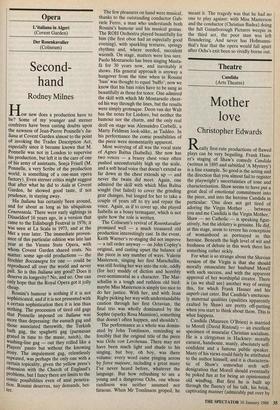Opera L'italiana in Algeri (Covent Garden) Second-
Rodney Milnes
ow new does a production have to be? Some of my younger and sterner confreres have been casting doubts upon the newness of Jean-Pierre Ponnelle's Ita- liana at Covent Garden almost to the point of invoking the Trades Description Act, especially since it became known that M. Ponnelle was not in London to supervise his production, but left it in the care of one of his army of assistants, Sonja Frisell (M. Ponnelle, a very Scribe of the production world, is something of a one-man opera factory). Even sterner critics might suggest that after what he did to Aida at Covent Garden, he showed good taste, if not prudence, in staying away. His Italiana has certainly 6een around, and for about as long as his ubiquitous Cenerentola. There were early sightings in Dusseldorf 16 years ago, in a version that came to the Edinburgh Festival in 1976; it was seen at La Scala in 1973, and at the Met a year later. The immediate proven- ance of this particular edition was late last year at the Vienna State Opera, with whom Covent Garden shared costs. No matter: some age-old productions — the Strehler Boccanegra for one — could be reproduced all over the world and never pall. So is this Banana any good? Does it deserve its longevity? No, and no. One can only hope that the Royal Opera got it jolly cheap. Rossini's humour is nothing if it is not sophisticated, and if it is not presented with a certain sophistication then it is less than nothing. The procession of tired old gags that Ponnelle imposed on haliana was more than depressing: the eunuch gag and those associated therewith, the Turkish bath gag, the spaghetti gag (parmesan grated in time to the music, natch), the washing-line gag — out they rolled like a Players' panto but without the knowing irony. The impalement gag, relentlessly repeated, was perhaps the only one with a certain topicality, given the yellow press's obsession with the Church of England's Problems, but I fancy there are limits to the comic possibilities even of anal penetra- tion. Rossini deserves, nay demands, bet- ter. The few pleasures on hand were musical, thanks to the outstanding conductor Gab- riele Ferro, a man who understands both Rossini's humour and his musical genius. The ROH Orchestra played beautifully for him (the first oboe had an especially good evening), with sparkling textures, springy rhythms and, where needed, succulent warmth. On stage, matters were less sure. Paolo Montarsolo has been singing Musta- fa for 30 years now, and inevitably it shows. His general approach is anyway a hangover from the time when in Rossini 'bass' was thought to equal 'buffo'; now we know that his bass roles have to be sung as beautifully as those for tenor. One admired the skill with which Mr Montarsolo cheat- ed his way through the lines, but the results were simply grotesque. Deon van der Walt has the notes for Lindoro, but neither the humour nor the charm, and the only real droll on stage was Alessandro Corbelli, a Marty Feldman look-alike, as Taddeo. In his performance the comic possibilities of the piece were momentarily apparent.
Most worrying of all was the vocal state of Agnes Baltsa (Isabella). She now has two voices — a brassy chest voice often pushed uncomfortably high up the scale, and a soft head voice that doesn't extend as far down as the chest extends up — and never the twain did meet. Again, one admired the skill with which Miss Baltsa sought (but failed) to cover the grinding gear changes, but longed for her to take a couple of years off to try and repair the voice. Again, as if to cover up, she played Isabella as a bossy termagant, which is not quite how the role is written.
The Coliseum's revival of Rosenkavalier promised well — a much treasured old production interestingly cast. In the event, Keith Warner's re-staging did not improve — a tall order anyway — on John Copley's original, and casting upset the balance of the piece in any number of ways. Valerie Masterson, singing her first Marschallin, was still feeling her way into the role, oddly (for her) muddy of diction and horribly over-sentimental as a character. The Mar- schallin is a tough and ruthless old bird: maybe Miss Masterson is simply too nice to do her justice. With her, and with Jean Rigby picking her way with understandable caution through her first Octavian, the final trio was wholly dominated by the Sophie (sparky Rosa Mannion), something that doesn't often happen, and shouldn't.
The performance as a whole was domin- ated by John Tomlinson, reminding us forcibly that the original title of the piece was Ochs von Lerchenau. There may not have been much light and shade to his singing, but boy, oh boy, was there volume: every word came pinging across by force majeure, including a great many I've never heard before, whatever the language. But how refreshing to see a young and a dangerous Ochs, one whose randiness was neither assumed nor fatuous. When Mr Tomlinson groped, he meant it. The tragedy was that he had no one to play against: with Miss Masterson and the conductor (Christian Badea) doing the full Gainsborough Pictures weepie in the third act, the poor man was left floundering. And never has Hofmanns- thal's fear that the opera would fall apart after Ochs's exit been so vividly borne out.


















































 Previous page
Previous page